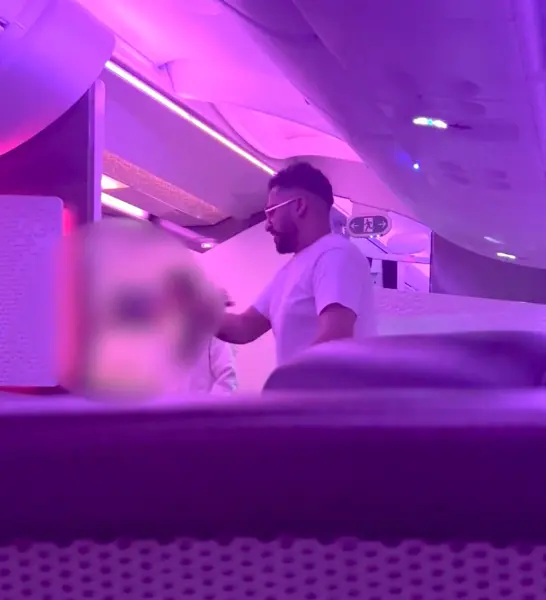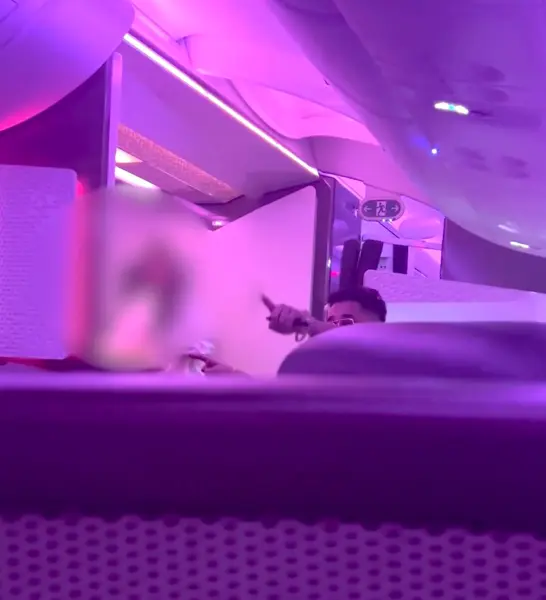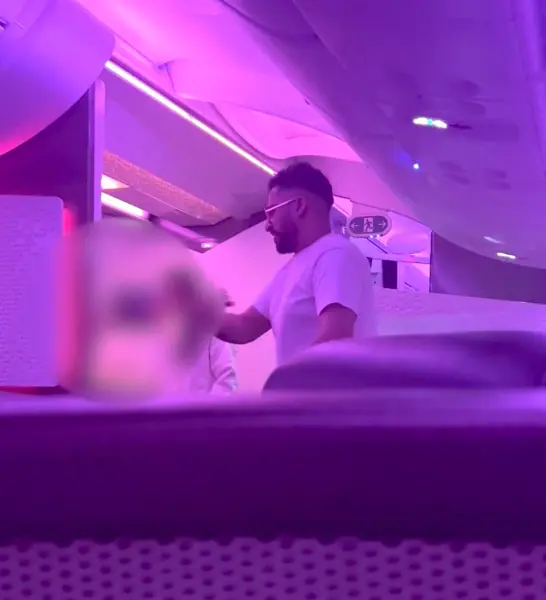Salman Iftikhar, the First-Class Passenger Who Threatened a Flight Attendant in a Shocking Mid-Air Tirade, Sees His Jail Term Tripled After Appeal
Salman Iftikhar, a 37-year-old British millionaire who turned a luxury flight into a terrifying ordeal, has seen his jail sentence tripled after the Court of Appeal ruled that his original punishment was far too lenient. The decision marks the latest chapter in a disturbing case that has drawn global attention for its mix of privilege, aggression, and accountability.

The February 2023 incident unfolded aboard a Virgin Atlantic flight from London Heathrow to Lahore, Pakistan. Iftikhar, who was traveling in first class with one of his wives and their three children, began the journey quietly, ordering champagne shortly after take-off. But what began as indulgence soon spiraled into chaos. According to multiple witnesses and court records, he became increasingly agitated after helping himself to ice from the on-board bar and being politely asked by crew to return to his seat.
What followed was a torrent of verbal abuse, intimidation, and threats that left passengers horrified and crew members fearing for their safety. Iftikhar, who owns a recruitment firm called Staffing Match, launched into an expletive-filled tirade against a senior flight attendant named Angie Walsh. Prosecutors later described his words as “vile, targeted, and violent,” including explicit threats that referenced gang rape and arson. His behavior escalated so drastically that the flight’s captain considered diverting to Turkey for an emergency landing.
Passengers recorded parts of the meltdown on their phones. The footage shows Iftikhar standing in the aisle, gesturing aggressively at staff and shouting as cabin lights flashed pink from the mood lighting. At one point, he accused crew members of racism, shouting, “You called me a P*** in front of everyone!” before making several violent threats. “I’ll find your hotel in Lahore,” he said, according to court testimony. “You’ll be dragged out, gang-raped, and set on fire.” Those words, directed at Walsh, would later define the case — and haunt the victim for months.

When the flight landed in Lahore, Iftikhar was detained by Pakistani authorities, questioned, and released to return to the United Kingdom. But the investigation by British police was already underway. He was formally charged in March 2024 and later appeared before Isleworth Crown Court, where he pleaded guilty to making threats to kill and racially aggravated harassment.
In August 2025, the court sentenced him to just 15 months in prison — a decision that outraged observers and advocates for victims of abuse. Critics argued that the punishment didn’t reflect the psychological trauma inflicted on Walsh and the danger posed to others on the flight. Virgin Atlantic, in a rare public statement, praised its crew’s professionalism and said it maintained a “zero-tolerance policy for any abuse of staff,” but the airline’s union quietly lobbied for a harsher precedent.
The Crown Prosecution Service referred the case to the Court of Appeal under the “unduly lenient sentencing” scheme. On November 11, 2025, that court handed down a dramatically revised judgment: Iftikhar’s jail time was tripled to four years and three months. Judges cited “prolonged intimidation, sustained threats, and the victim’s enduring fear” as reasons for the new term. They emphasized that alcohol was “no excuse” and that his status as a businessman or father offered no mitigation.

For the victim, the ruling brought partial relief. Angie Walsh, a veteran crew member with 37 years of service, had taken a year-long leave of absence after the incident. In a statement read by prosecutors, she described how she could not sleep, avoided air travel, and even considered retirement. “I’ve always loved my job,” she said. “But this broke me. I’ve never felt so powerless and unsafe.”
Iftikhar’s background only deepened public scrutiny. Described in media reports as a “self-made millionaire” who flaunted luxury cars and designer suits on social media, he projected an image of sophistication and success. But his record told a different story. Court documents revealed six previous convictions tied to 15 offenses, including drunk-driving and assault. Prosecutors said his outburst fit a pattern of volatility when drinking.
During sentencing, Justice Murray Shankland said, “This was not a momentary lapse in temper. It was a sustained, targeted campaign of threats directed at a woman simply doing her job, in front of passengers and your own family. The humiliation and fear you caused cannot be overstated.”
Witnesses on the flight recalled the surreal tension as Iftikhar’s children began crying and his wife pleaded with him to calm down. “It was like something snapped,” one passenger told reporters afterward. “He was yelling, pacing, waving his arms. The staff handled it incredibly well, but you could see the fear in their eyes.”

Legal experts have noted that the case carries significance beyond its headlines. Under British law, incidents aboard UK-registered aircraft fall under domestic jurisdiction, even if they occur outside national airspace. The Iftikhar judgment reinforces the courts’ willingness to impose severe sentences for mid-air threats — particularly those involving violence or sexual intimidation. “This sends a clear message,” said aviation lawyer Mark Lewis. “Cabin crew are not punching bags. Abuse at 35,000 feet will be treated with the same seriousness as abuse on the ground — if not more.”
Public reaction to the new sentence has been mixed. While most welcomed the tougher penalty, some questioned why it took nearly three years for justice to reach its conclusion. Others pointed to systemic issues in sentencing consistency, with similar cases of racially or sexually charged threats sometimes resulting in lesser punishment. Yet across social media and news commentary, one theme dominated: accountability. Wealth and first-class status, many argued, had shielded Iftikhar from consequences for too long.
In Pakistan, where the flight was headed, coverage of the case struck a more complex tone. Several outlets framed it as a cautionary tale about diaspora arrogance — a reminder that money and dual nationality don’t erase basic standards of decency. Others viewed the ruling as a sign that British courts are increasingly unwilling to tolerate what’s been termed “air rage elitism,” where passengers in premium cabins lash out under the influence.

Back in the United Kingdom, Virgin Atlantic has implemented new protocols for dealing with disruptive passengers, including mandatory post-incident counseling for crew and expanded liaison with law enforcement. Union representatives for cabin staff hailed the Iftikhar ruling as “a turning point for the industry.” In an internal memo leaked to The Times, one senior flight-operations manager wrote, “Our crew endure verbal abuse more often than the public realizes. This verdict finally recognizes the seriousness of that trauma.”
Despite the severity of his behavior, Iftikhar has shown little public remorse. During his trial, he apologized through his defense attorney but claimed he had “no memory” of the incident due to alcohol. He has since been described as a model prisoner by correctional officers but faces civil suits from two passengers who allege distress from the flight. His business holdings are also under review, as investors distance themselves from the scandal.
For Walsh and her colleagues, however, the matter is far from forgotten. She has not returned to long-haul service, though she attended court hearings and reportedly wept when the extended sentence was read. “Justice was done today,” she said outside the courthouse. “Not just for me, but for everyone who has to face that kind of abuse while doing their job.”
As stories of in-flight violence continue to surface worldwide, the Iftikhar case serves as both a warning and a precedent. It underscores how quickly entitlement can morph into cruelty and how vital it is that justice keeps pace with it. A first-class ticket, champagne service, and designer suit could not shield one man from accountability — and, for many, that is exactly how it should be.


